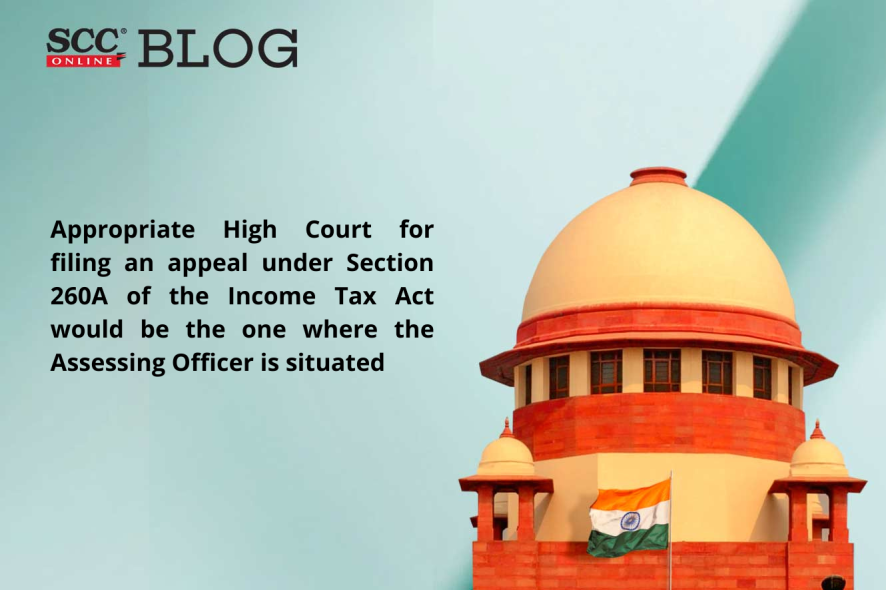Supreme Court: Dealing with an important question relating to appellate jurisdiction of the High Courts under Section 260A of the Income Tax Act, 1961 (the Act) against judgments of Income Tax Appellate Tribunals (ITAT), the bench of UU Lalit, S. Ravindra Bhat and PS Narasimha*, JJ has held that appeals against every decision of the ITAT shall lie only before the High Court within whose jurisdiction the Assessing Officer who passed the assessment order is situated.
Interestingly, Section 260A is open-textual and does not specify the High Court before which an appeal would lie in cases where Tribunals operated for plurality of States. Hence, as Benches of the ITAT are constituted to exercise jurisdiction over more than one state, each state having a separate High Court, question arose as to which of the High Court is the appropriate Court for filing appeals under Section 260A. The Supreme Court observed that the decision of the High Court of Delhi in the case of Seth Banarsi Dass Gupta v. Commissioner of Income Tax, 1978 SCC OnLine Del 43, wherein it was held that the appropriate High Court would be the one where the Assessing Authority is situated, continuous to hold the field.
However, due to a difference of opinion between the Punjab and Haryana High Court and the Delhi High Court, a further question arose before the Supreme Court relating to the jurisdiction of the High Court consequent upon administrative order of transfer of a ‘case’ under Section 127 of the Act from one Assessing Authority to another Assessing Officer located in a different State.
The Punjab & Haryana High Court took the view that such a transfer would not change the principle laid down in Seth Banarasi Dass Gupta. However, the Delhi High Court in CIT v. Sahara India Financial Corporation Ltd, 2007 SCC OnLine Del 1762 and CIT v. Aar Bee Industries Ltd, 2013 SCC OnLine Del 2356 has held that an administrative order of transfer of cases will also have the consequence of transferring even the jurisdiction of the High Court.
The Supreme Court, however, reversed the judgments of Delhi High Court on this aspect and held that the appellate jurisdiction of the High Court stands on its own foundation and cannot be subject to the exercise of executive power to transfer a ‘case’ from one Assessing Officer to another Assessing Officer.
“Even if the case or cases of an assessee are transferred in exercise of power under Section 127 of the Act, the High Court within whose jurisdiction the Assessing Officer has passed the order, shall continue to exercise the jurisdiction of appeal. This principle is applicable even if the transfer is under Section 127 for the same assessment year(s).”
The Court further observed that if it is the accepted principle to determine the jurisdiction of a High Court under Section 260A of the Act on the basis of the location of the Assessing Officer who assessed the case, then, by the strength of the very same logic, upon transfer of a case to another Assessing Officer under Section 127, the jurisdiction under Section 260A must be with the High Court in whose jurisdiction the new Assessing Officer is located.
Stressing on the ‘need for order’ and consistency in decision making, the Court noted that a decision of a High Court is binding on subordinate courts as well as tribunals operating within its territorial jurisdiction. It is for this very reason that the Assessing Officer, Commissioner of Appeals and the ITAT operate under the concerned High Court as one unit, for consistency and systematic development of the law.
The Court also explained that the decisions of the High Court in whose jurisdiction the transferee Assessing Officer is situated do not bind the Authorities or the ITAT which had passed orders before the transfer of the case has taken place. This creates an anomalous situation, as the erroneous principle adopted by the authority or the ITAT, even if corrected by the High Court outside its jurisdiction, would not be binding on them.
“The legal structure under the Income Tax Act commencing with Assessing Officer, the Commissioner of Appeals, ITAT and finally the High Court under Section 260A must be seen as a lineal progression of judicial remedies. Culmination of all these proceedings in question of law jurisdiction of the High Court under Section 260A of the Act is of special significance as it depicts the overarching judicial superintendence of the High Court over Tribunals and other Authorities operating within its territorial jurisdiction.”
[Commissioner of Income Tax v. ABC Papers Ltd, 2022 SCC OnLine SC 1036, decided on 18.08.2022]
*Judgment by: Justice PS Narasimha
For Revenue: ASG N. Venkatraman
For Assessee: Advocate Rohit Jain







